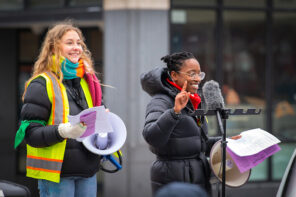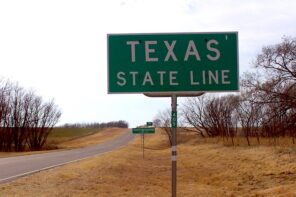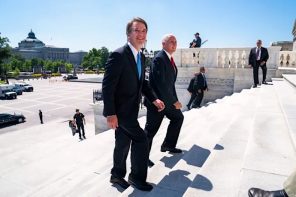Can public school employees use their position of authority to impose religious rituals on other people’s children? “NO” has been the resounding and obvious answer to this question for decades, but on Friday, the Supreme Court agreed to hear a truly dangerous “religious freedom” case, Kennedy v. Bremerton School District. This packed, political court is likely to say “YES” and rewrite every American’s religious freedom rights.
An assistant football coach at the Bremerton School District in Washington used his access to students and the stage that is the football field to kneel at the center of the field in prayer with his students after games.
The Supreme Court struck down school-sponsored prayers in 1962 and confirmed that this applies to prayer at public school football games in 2000. Several federal courts have also specifically held that when a coach prays with students as a coach it’s “an unconstitutional endorsement of religion” because the coach is a government actor wielding government power, not speaking or worshiping as an individual.
This isn’t controversial, nor does it rob the coach of his rights. In fact, this coach was free to pray. He could have bowed his head at any time and said a little prayer on the sideline to himself. But the coach doesn’t just want to pray, he wants to use the power of a public school position to impose that ritual on an entire community.
Halting this abuse of power does not violate the coach’s First Amendment rights. An analogy is useful here. Imagine instead that the coach was hurling curses or obscenities at students after the game. Does he really have a free speech right to do so, or can the school ask him to stop? Of course he can be ordered to stop without it violating his First Amendment rights because he’s not acting in his personal capacity, but in his official capacity; so he’s bound by rules that restrict government actors, including the separation of state and church.
And if you’re still thinking about this coach, consider everyone else. Think instead of the young Jewish student left on the sideline while his public school team gathers on the field without him (or worse, who joins the Christian prayer because he feels pressured to conform). The separation we require between government power and religious ritual protects everyone’s religious freedom.
On the basis of this clear rule, the school asked the coach to stop using his position of authority and access to pray with his students. The coach refused and was placed on administrative leave. His contract expired and he didn’t reapply.
Instead, he sued, demanding to be rehired and the right to abuse his power. And he’s been represented by the First Liberty Institute, a Christian Nationalist legal outfit bent on redefining religious freedom under the First Amendment. The Institute’s goal is to morph the hallowed protection for religious freedom, the shield, into a tool to impose that religion on others, a weapon.
The coach and the Institute aren’t seeking religious freedom, but religious privilege. They don’t want equal treatment (nobody else is allowed on the field to pray), but special treatment for the ostentatiously pious Christian. (One wonders if the Institute or coach have read Jesus’s Sermon on the Mount recently, specifically his condemnation of public prayer as hypocrisy.) They’re not seeking a right to exercise religion in a personal way free from government interference, but to use government power to extend the reach of that religious exercise over the entire community.
When it asked the Supreme Court to take the case, the Institute brazenly claimed the prayers were “a quiet prayer by himself,” a “personal prayer,” and “a silent or quiet prayer.” As the photos show, this is untrue.
And here's more of the "silent" and "personal" prayer practice. pic.twitter.com/sWPRJiNKTU
— Bradley Girard (@BradleySGirard) January 14, 2022
A judge on the Ninth Circuit called out the Institute’s dishonesty, writing that its claim that the coach “was disciplined for holding silent, private prayers” was “a deceitful narrative … spun by counsel.” As a lawyer that values professional responsibility, I’d be devastated to read that in a judicial opinion about my work and possibly take it as a signal of incoming ethics charges, but the Institute took it as a sign to repeat the “deceitful narrative” to the Supreme Court.
If you’ve followed the last decade of the Supreme Court’s work to weaponize religious freedom, this is unsurprising. The justices themselves alter narratives, history, facts, and reality to reverse engineer decisions that, for instance, allow a 40-foot tall Christian cross to be rebuilt with government funds and remain on government property.
The Institute itself has a long history of trafficking in dishonesty and Christian nationalism. It “promote[s] Judeo-Christian values” but wants Christian supremacy, which the Institute wraps in “religious freedom” claims that average Americans understand as equality. It’s fought to keep evolution out of public schools; and put Bible classes, Jesus portraits, and school-imposed prayer in public schools. That last effort is what Kennedy v. Bremerton School District is all about.
I first wrote about this case back in 2015, focusing on how the Institute doesn’t mind taking losing cases because they’ll keep them alive for years and fundraise off their false narratives. And if the courts follow precedent and the Constitution, this is clearly a losing case. But I wrote that article more than a year before the 2016 presidential election, and since then, the Supreme Court has been packed with Christian nationalists who are, to state the case mildly, highly sympathetic to the Institute’s crusade to weaponize religious freedom.
In fact, one of the Institute’s own lawyers is now a federal judge—you may remember Matthew Kacsmaryk as the judge who abused his power to force the Biden administration to reinstate Trump’s “Remain in Mexico” policy. (Another Institute lawyer, Jeff Mateer, was nominated to the federal bench but his virulently anti-LGBTQ remarks that surfaced were apparently even too much for Trump and McConnell, and his nomination was pulled. He’s back at the Institute as Executive Vice President and Chief Legal Officer working on this case.)
The change in the Court’s personnel should never change the law, but that’s precisely why the Court was packed. So what happens when the Supreme Court adopts the Institute’s weaponized version of religious freedom? Just how bad could it be?
In this case, the impact could be devastating. Public education is a sacred trust. Parents of all religions and none can confidently send their children to public school knowing that the Constitution protects their freedom of conscience—knowing that the Constitution reserves the religious education of children for the family, not the state.
This case isn’t about protecting one man’s religious freedom, it’s about preventing overreaching government officials from imposing their religion on other people’s children. And I have no faith that this Supreme Court will get it right.





